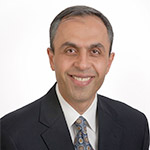How Can You Find the Top Expert Neurosurgeon for Your Surgery?
When a patient is diagnosed with a condition such as a brain tumor that requires brain surgery, there is a lot at stake. The stress of the diagnosis combined with the treatment options are overwhelming. In addition to these stresses, the patient and his or her family want to find the top neurosurgeon who can do the best job possible. How can the patient and his or her family find the best neurosurgeon for the surgery during these stressful times?
I recommend a second opinion for patients facing a major brain operation with associated risks. The peace of mind that a second opinion provides can be quite comforting and reassuring. However, if the second opinion is different from the first opinion, there is a risk of adding more stress and the need for a third opinion. Most often, the first and second opinions are consistent with each other and the peace of mind from the second opinion is worth the risk.
Peace of mind and the trust between the patient and surgeon are the foundation for the patient to be well prepared for an operation. The patient should believe in his or her surgeon through trust and confidence. The vulnerability of the patient places a significant burden on the surgeon to create this trust.
How Can the Patient Select a Top Neurosurgeon for Surgery?
Going to a major health care center due to its reputation does not guarantee great results. In fact, some surgeons rely on the reputation of where they work rather than their own abilities to create the value of their work. This can lower the bar for the surgeon to pursue excellence.
When the patient is faced with the choice to choose his or her top surgeon, how can he or she find the best? What defines the top neurosurgeon? Unfortunately, the patient does not have the expertise to know who is the best and therefore must he or she rely on the information on the Internet? Or the connections among the referring doctors and the surgeon?
Does this mean that major health care centers and surgeons who have the largest marketing resources and therefore can rank high on Google search results are the “best?” Ranking high on Google results, having a great reputation as a health care system, and great connections with referring doctors do not guarantee a suitable surgeon and great results. These are not objective measures that define the quality of surgical techniques.
Since the patient is faced with a difficult choice and does not have enough information about the surgeon, he or she often decides based on the referring doctor’s recommendation or the reputation of the health care center. The additional effort to travel etc. may bring the patient peace of mind that he or she has done everything possible to get the best care.
Herein I will explain how a patient diagnosed with a brain tumor, meningioma, glioma, acoustic neuroma, hemifacial spasm, arteriovenous malformation etc. could approach selection of his or her surgeon or surgical team:
- Take the time to read on multiple reputable websites about your surgeon and his or her qualifications. Focus on objective measures that demonstrate excellence in surgical skills based on the awards and recognitions. A great bedside manner does not always translate to great surgical skills in the operating room.
- High-yield national and international awards related to surgical outcomes and especially recognitions outside their own institutions are of greatest value. The traditional doctor online reviews are misleading and not directed at the skills of the surgeon. Subspecialty training in the surgery of interest is a needed qualification.
- The surgeon that participates actively in a multidisciplinary health care delivery team is likely to provide the most well-rounded opinion. The surgeon should participate in a local or national Brain Tumor Board or Cerebrovascular Conference to obtain other opinions for high-risk cases and allow for the surgeon’s continuing education from colleagues.
- There is no need to rush the process of surgeon selection and believe that all surgeons are qualified equally based on a relatively short office visit experience. Your care after surgery is dependent on the institution you choose but the most important part, i.e. your surgery, is dependent on your specific surgeon’s expertise.
My personal surgical philosophy has always been:
The pursuit of technical excellence in neurosurgery is a passion and not a job. I have always believed that for any patient, I must do the best anyone can, rather than do the best I can. This is what I would have wanted if I were the patient.
Do not hesitate to get a second opinion from another surgeon. This will allow you to get the peace of mind that you deserve!




